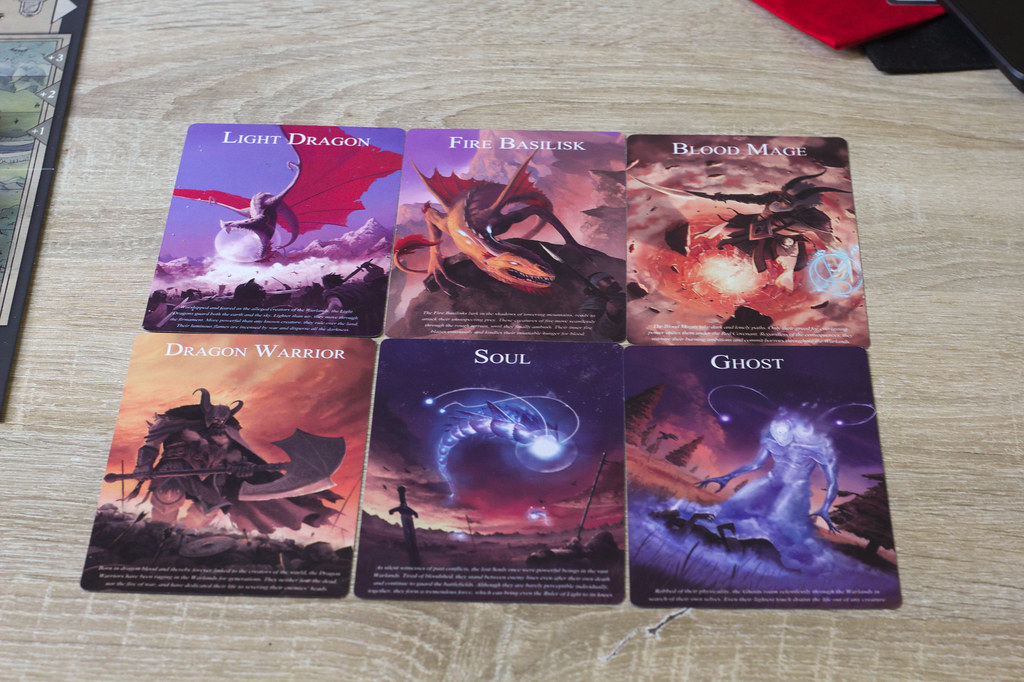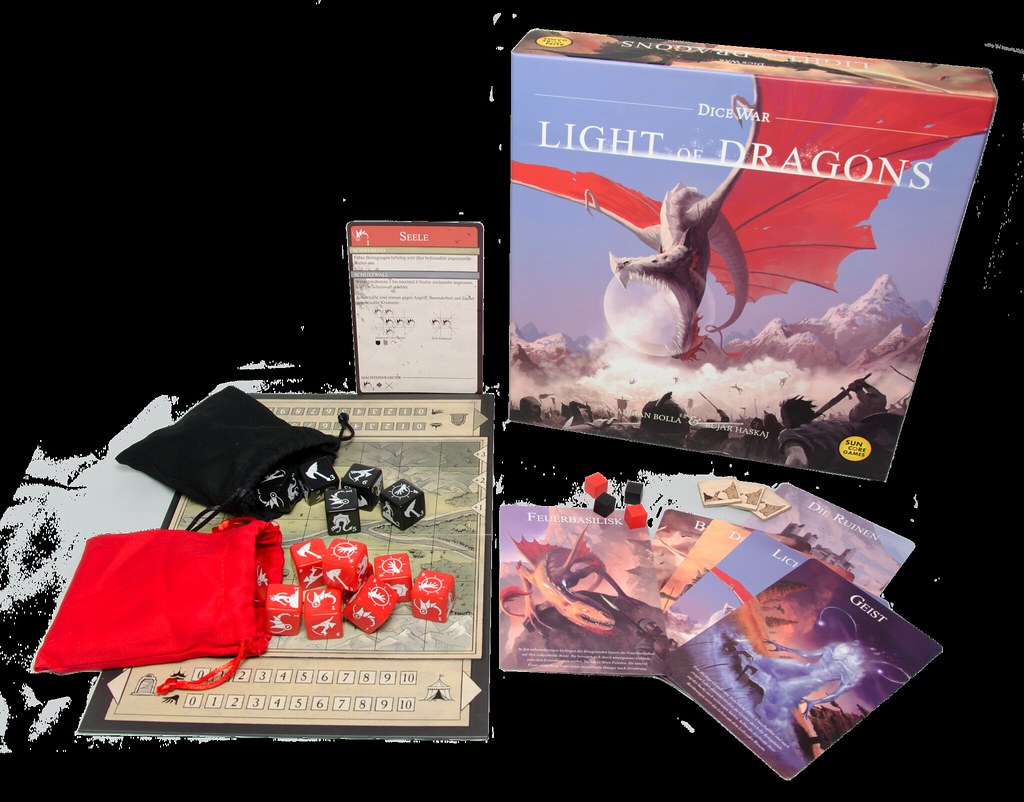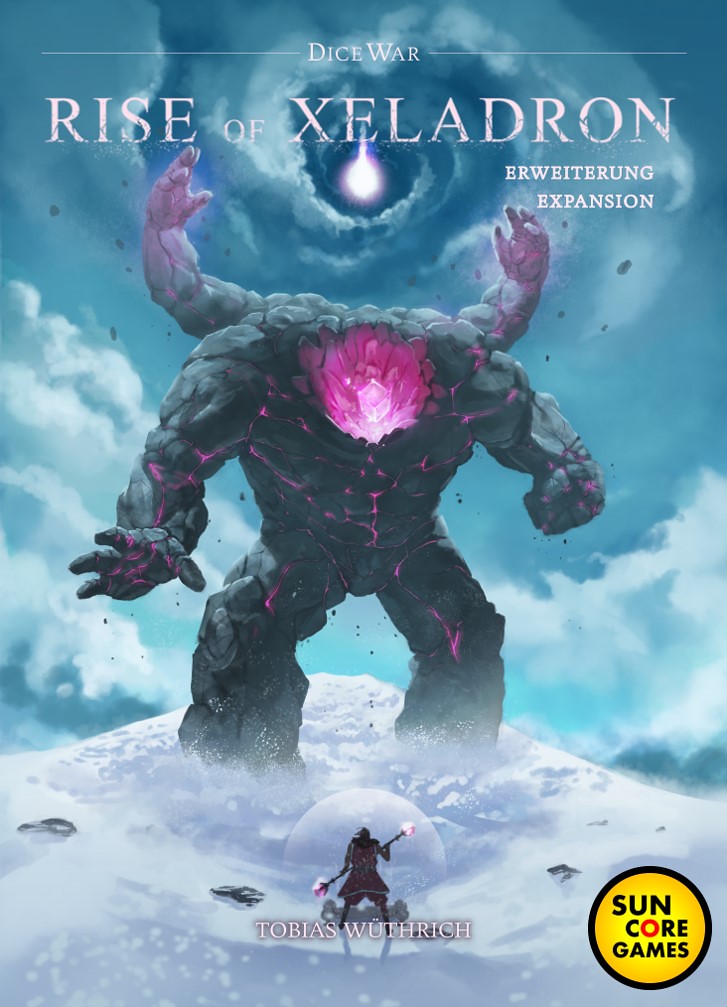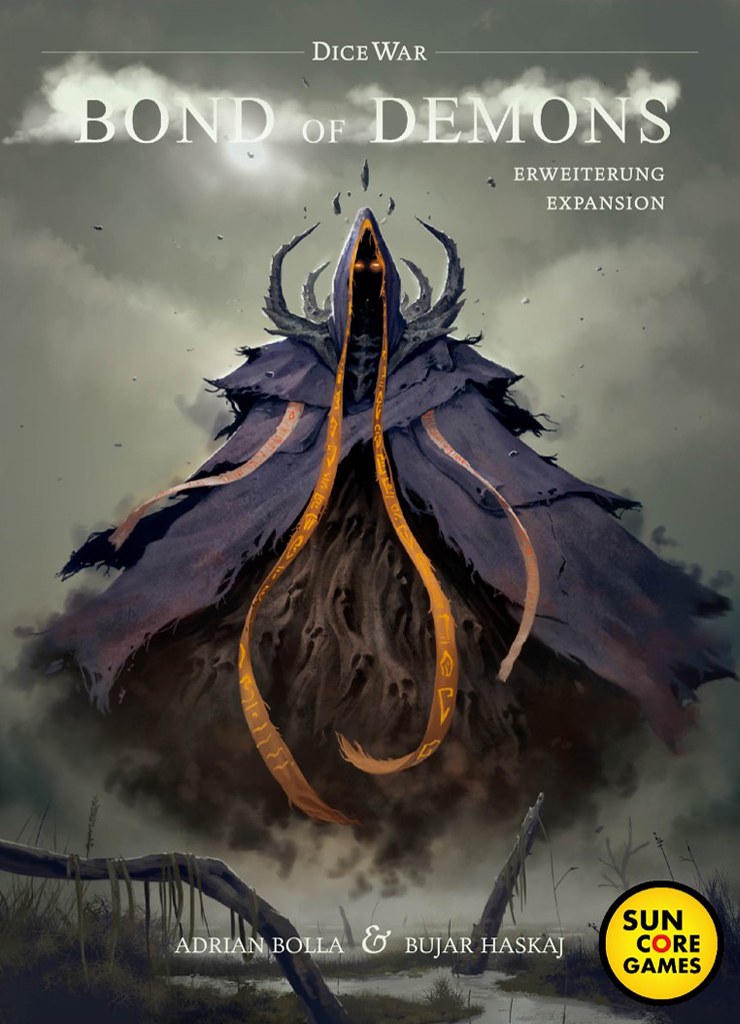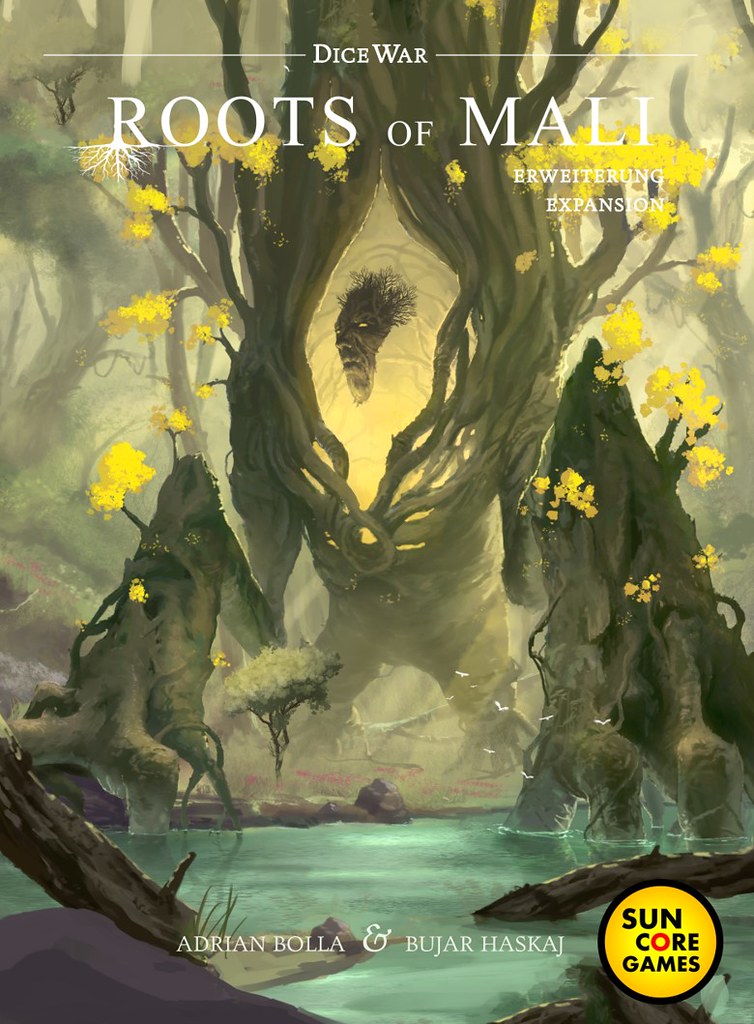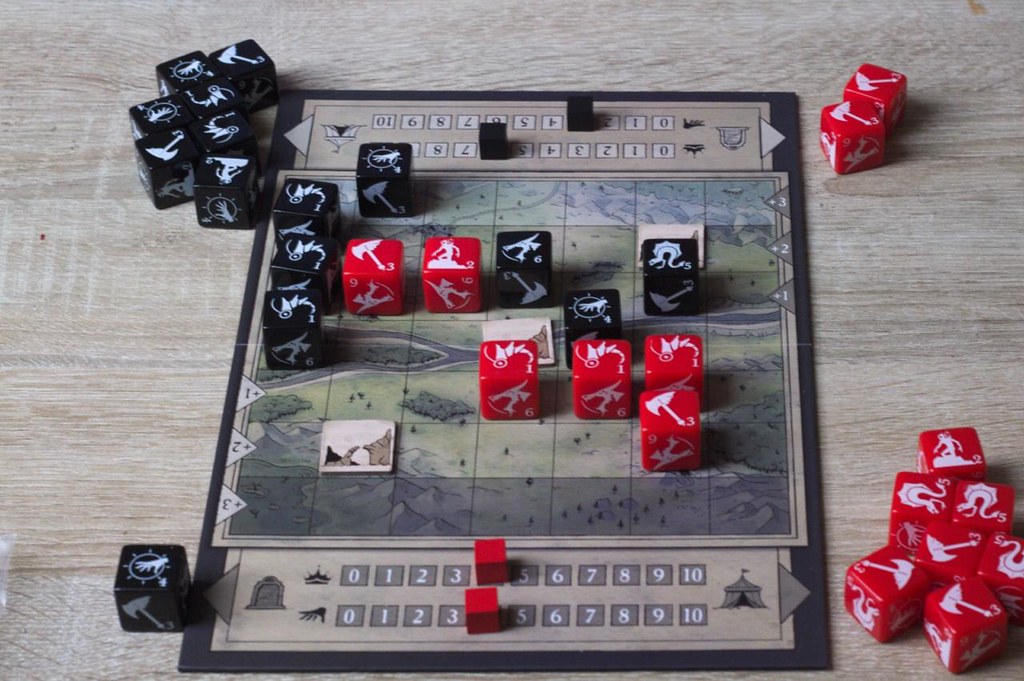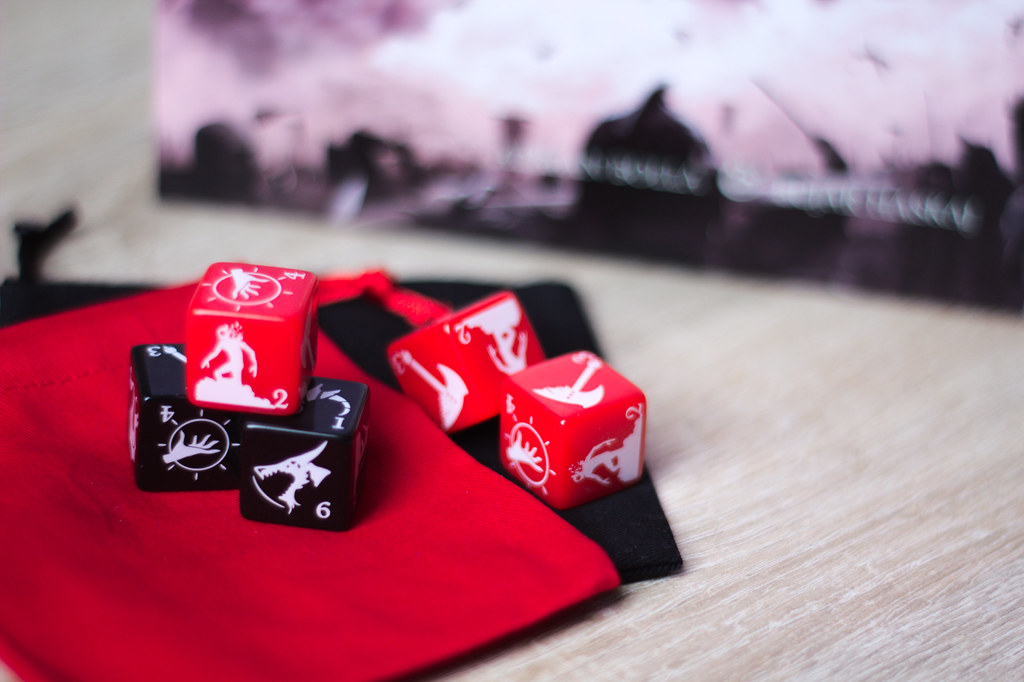A dice-heavy board game highly involves the aspect of luck, usually that is. This mainstream point of view was perhaps not appealing for the Switzerland based designer and publisher, Suncore Games. Thus they tried to break the stigma by engineering a game with dice and cognitive skill as its main components. We had the chance to do an in-depth review after Adrian and Bujar gave us one demo copy of DiceWar: Light of Dragons post-Spiel Essen 2018.
An Overview of The Rules and The Game Flow
In DiceWar: Light of Dragons, two players jump into the realm and age where magic and extra terrestrial creatures roam the lands. Keeping those at hands, players fight their way to control the disputed warring land. Players take control of the creatures imprinted on each side of the dice and race to be the first one to gain 10 Victory Points (VP). Whoever can do it first will be the winner of the game.
The creatures that players will control are: Soul, Ghost, Dragon Warrior, Blood Mage, Fire Basilisk, and Light Dragon. Each has a hierarchy from 1-6 with its own unique skill and effect. To set up the game, players arrange the composition of his/her troop for the first round. The sum of the hierarchy number should not exceed 10. For example, the first troop may be composed of five Ghost (no. 2 in hierarchy), or a combination of hierarchy 1, 3, 4, and 2.
The rest of the dice are then set aside to the reserve pile. After both players has cast a dice, whoever gets the higher number will be determined as the first player. On each turn, players need to check the Trigger Point (TP) before taking one out of four actions available. Those actions are:
- Moving controlled creature to the adjacent, unoccupied space;
- Attacking by moving the controlled creature to the adjacent space occupied by other player’s creature;
- Upgrade to increase the power hierarchy of one controlled creature by 1; and
- Casting spell by spending the TP.
In order to perform the second option, the power hierarchy of the attacked creature needs to be lower than the attacking creature. The hierarchy system is actually quite simple. It goes through like this: 6>5>4>3>2>1. As an exception, the creature with power level 3 can also attack the creature level 6. When a creature is attacked, then the dice needs to be set aside to the exile pile.
After performing one of the actions available, the player then checks the VP in order to determine whether the winning condition has been fulfilled or not. If it’s still not reached, then the game is continued and it’s the other player’s turn. The VP can be gained by attacking opponent’s creatures. The attacking player then gains amount of VP based on the hierarchy level of the attacked creature; there are several columns that grant bonus VP when player attacks the opponent’s creature occupying one of those spaces.
Alternative playing mode
In this core game of DiceWar, Suncore Games also included one component that may be used to alternate the game play. With The Ruins component, there is one more winning condition imposed to the game. This expansion will occupy three determined tiles and when one player is able to occupy all three tiles at the same time in his turn, then he wins the game.
Expansion
Suncore Games has published three expansions for DiceWar: Light of Dragons until now. Besides the latest Rise of Xeladron expansion, they have also released Roots of Mali and Bonds of Demon on the previous years. Each expansion offers a set of dice with the same rules and game play, but different skills and effects.
In comparison to the straight forward game play from dice set of Light of Dragons, the creatures in Roots of Mali is more dynamic and they work perfectly when they get together; Bonds of Demon is rather sneaky where you have to set traps to strike down the opponent; and the latest Rise of Xeladron focuses more to the mobility for a surprise big attack.
Opinion, Game Play, and Experience
It takes quite a long time to play one session, but I don’t think it’s a big problem for those who craves brain teasers. However, if this game is offered to those who long for casual gaming, DiceWar might not be a solid choice. Light of Dragons contains dice set with a to-the-point kind of game play that is very helpful to learn the basic of DiceWar. Players will gather the army, mobilize, and upgrade whenever necessary to commence the attack.
The most notable part that needs to be underlined is that Dragon Warrior (level 3) has the exception to attack the Light Dragon (level 6) shows that this game is designed carefully in mechanism. Thematically, it fits perfectly knowing that even Warriors can kill Dragons and of course vice versa in the battle. Nice job, Suncore Games! Although it is written that it takes approx. 10-30 minutes to play DiceWar, most of my duel sessions exceeded this time range. Well, it may be mostly caused by the analysis paralysis that occurs mostly in board games packed heavily with strategy and tactics.
The similarities, although not uncanny, are shared through the area control and a bit resource management mechanism between DiceWar: Light of Dragons and chess, the classic duel board game. The role of the creatures are really flexible, since players may opt to upgrade the power level through upgrade action or the spell cast by the Blood Mage. Dragon Warrior and Light Dragon may “split” to be other creatures with lower power level if necessary. This enriches the plan players may devise during the game.
The expansions provide variety in game play and usable creatures. The publisher also mentioned that players may use dice from two different sets without worrying being overpowered. For example, I use the dice set from Light of Dragons to play against someone who chooses the dice set from Rise of Xeladron. Players do not need to worry that problems like over power skill and imbalance would rise. It shows how Suncore Games really did their homework to play test this game intensively in order to find the balance for everything.
Fazit
DiceWar: Light of Dragons is actually not a light game. It’s truly easy to learn, but the complexity lies in the strategy planning and tactics employment. Thus, I can say that this game may be categorized as medium to heavy game causing players vulnerable to analysis paralysis. The game might feel monotonous and boring if the game goes on too long since players take too much time in making their decision. On another side note, this game has a high replayability, especially if you have the expansions available. Its competitive nature has its audiences leading to an integrated league or competition.
This review is made possible thanks to Adrian Bolla, Bujar Haskaj, Tobias Wüthrich, and the whole Suncore Games’ crew. I hope we meet again in the next Spiel Essen, perhaps with more expansions and new games. Don’t forget to get the newest expansion, Rise of Xeladron through Suncore Games’ web or your local board game store available in December 2018!
I am a full-time food technologist during weekdays. However, when the calendar hits weekends, I transform into an avid board gamer. I am a hardcore Legend of the Five Rings (L5R) LCG player from Fantasy Flight Games (FFG). Current hobby: buying board games. My shelf of shame’s list is getting longer, thanks to you, Kickstarter.


